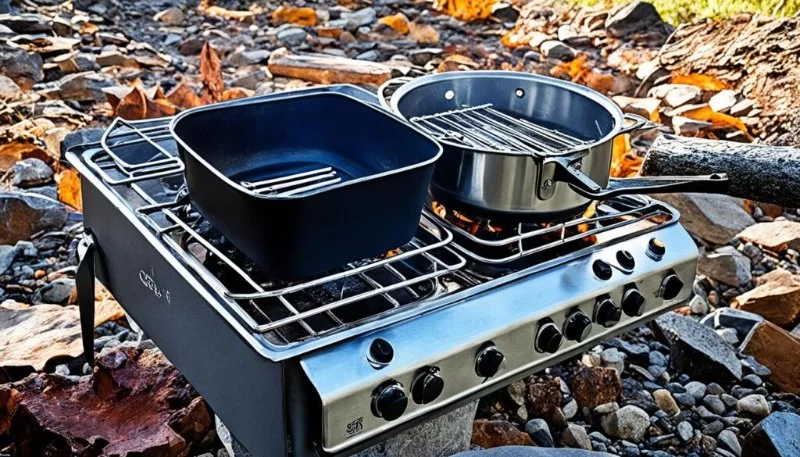Learn how to choose the best camping fuel for different cookware types. Explore canister, liquid, solid, and alcohol fuels, and get practical tips for your outdoor cooking experience.

- types-of-camping-fuel-and-how-they-work-with-cookware
- matching-fuel-types-to-camping-cookware
- practical-tips-for-choosing-the-right-camping-fuel
- real-camping-scenarios-and-what-we-learned
- where-to-find-quality-camping-fuel-and-gear
1. Types of Camping Fuel and How They Work With Cookware
1.1 Canister Fuel: Butane, Propane, Isobutane Mix
Canister fuel is one of the most popular choices for backpackers due to its convenience and lightweight nature. It works well with compact stoves and cookware made of aluminum or titanium that heat quickly. These fuels burn clean and are easy to ignite, making them ideal for boiling water or quick-cooking dehydrated meals.
1.2 Liquid Fuel: White Gas and Multi-Fuel Options
For colder climates or higher altitudes, liquid fuel is the gold standard. White gas burns hot and performs reliably in sub-zero temperatures. It’s often used with stainless steel or thicker aluminum cookware that can withstand longer cooking times and heavier flames. Multi-fuel stoves offer versatility but require more maintenance.
1.3 Solid Fuel: Esbit Tablets and Hexamine
Solid fuel tablets are ultra-light and simple to use, though they have limited heat output. They're great for solo hikers cooking with minimalist titanium mugs or pots. However, they may leave residue and aren't ideal for gourmet backcountry meals.
1.4 Alcohol Fuel: Denatured Alcohol or Ethanol
Alcohol stoves are favored by ultralight hikers. They’re silent, light, and burn consistently. Aluminum cookware performs best here due to its rapid heat conduction. But if you're cooking for more than one person, you might find alcohol’s lower heat output frustrating.
2. Matching Fuel Types to Camping Cookware
2.1 Titanium for Lightweight Needs
Titanium is perfect for ultralight setups, especially when paired with solid fuel or alcohol stoves. It heats fast, but watch out—it doesn’t distribute heat well, so simmering is tricky. Stick to simple meals like oatmeal or ramen.
2.2 Aluminum for Balanced Cooking
Anodized aluminum is an all-rounder. It works well with canister fuel and alcohol stoves. It’s light, conducts heat evenly, and resists scratches—ideal for beginners or those cooking more involved meals.
2.3 Stainless Steel for Durability
Stainless steel is heavier but tougher. It's the best match for liquid fuel stoves where more rugged, high-heat cooking is common—think frying bacon or simmering stew. It’s also a go-to for group camping trips.
3. Practical Tips for Choosing the Right Camping Fuel
3.1 Consider the Environment
Are you camping at altitude or in freezing temperatures? Liquid fuel performs better in cold environments, while canisters may struggle. Alcohol stoves are temperamental in the wind unless protected by a solid windscreen.
3.2 Fuel Availability and Transportation
In remote regions, it’s easier to find alcohol or solid fuel tablets than proprietary fuel canisters. If flying, transporting liquid fuel can be tricky—research local regulations in advance. For weekend trips near home, canisters are the easiest solution.
3.3 Cookware Compatibility
If your meals involve simmering or sautéing, prioritize cookware with thicker bottoms and fuel types offering better flame control. For simple boil-and-eat cooking, fuel and pot choice become more flexible.
4. Real Camping Scenarios and What We Learned
4.1 Backpacking in the Rockies
A pair of hikers heading into Colorado's alpine zones packed a multi-fuel stove and stainless steel pots. When temperatures dipped below freezing, their setup kept meals hot and hearty. The learning? Liquid fuel wins in cold, tough environments.
4.2 Lightweight Solo Trek in Patagonia
A solo traveler in South America opted for an alcohol stove with a titanium cup. Meals were minimalist, but packing light made trail days easier. Wind was an issue, but a DIY windscreen saved the trip.
4.3 Weekend Family Camp in a State Park
For a family camping near Pine Cliff Resort, a classic canister stove with an aluminum cookware set was ideal. Hot dogs, pancakes, and even s'mores were cooked easily—proof that fuel and cookware synergy makes a big difference in comfort and fun.
5. Where to Find Quality Camping Fuel and Gear
5.1 Rely on Trusted Suppliers
Choosing high-quality camping fuel is just as important as your cookware. Poor-quality fuel can clog stoves or burn inefficiently. Always buy from verified stores that understand outdoor needs.
5.2 Visit Pine Cliff Resort for Expert Picks
For reliable recommendations, head to Pine Cliff Resort, where seasoned outdoor experts can help you match the best fuel and cookware for your specific adventure. Whether it’s weekend car camping or a multi-day alpine trek, they’ve got the tools and knowledge to make it easier.
Gooseberry Falls State Park, Group Camp Site
Two Harbors, MN 55616, USA
Visit Location PageStore Gulch Campground
Selma, OR 97538, USA
Visit Location Page